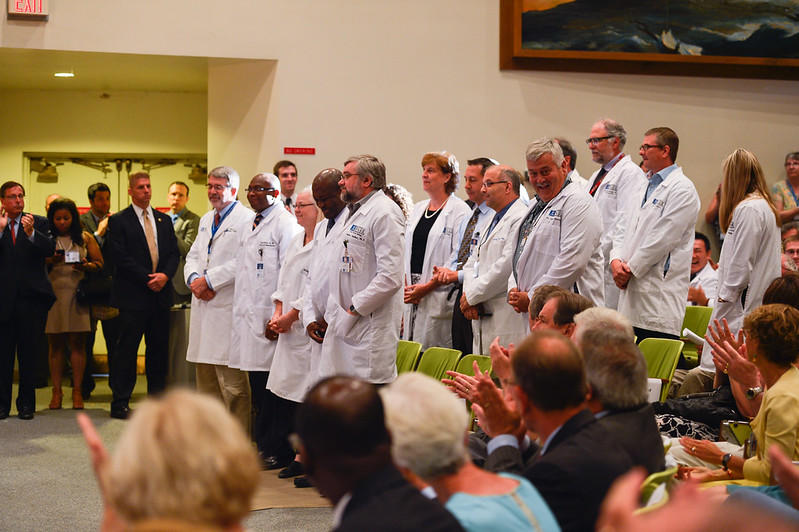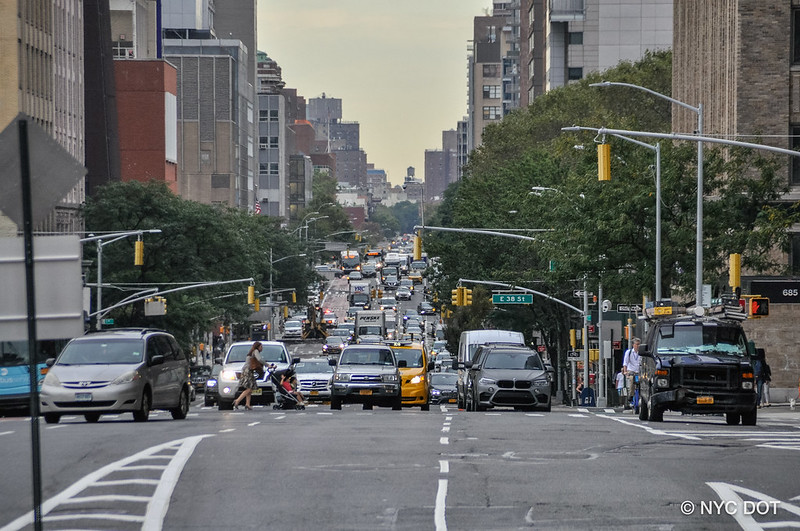Health Care Reform New York Should Tackle Now: A Rational Payment System

(photo: Governor's Office)
A New Yorker who suffers a heart attack is typically rushed to the nearest hospital for treatment. In a life-threatening emergency minutes matter, so the practice is sound public policy. Yet, if it turns out the hospital is not in the patient’s insurance network, the sigh of relief is short-lived. The bill for the care can top $100,000. Surprise!
Unaffordable medical bills are the top financial concern of two-thirds of Americans. The crazy system we have created of public and private health insurers, in-and-out of network providers, and hospitals and doctors who can charge any amount they please but do not have to disclose their prices publicly, leads to outcomes that are outrageously unfair on a regular basis, particularly for urgent care.
Since access to healthcare is a fundamental human need, an effective federal government would create a national system based on rational principles. Sadly, the United States Congress has been unable to achieve this goal, something every other advanced country in the world has accomplished. Two committees in the current House of Representatives session are considering surprise medical bill legislation, but there is no way to know if those efforts will yield results. New York should not wait and leave its people subject to the whims of Washington’s partisan political wars.
The New York State Assembly has twice passed the New York Health Act, a proposal to create a statewide single-payer system to replace the current structure. The New York State Senate, however, has not approved the legislation that would eliminate private insurance altogether in favor of a Medicare-like government program that would cover all New Yorkers. If New York were starting fresh, that might be a sensible way forward. But we are not. Millions of New Yorkers rely on employer-sponsored, private-insurer health plans and do not want to be forced off of them. Improving the quality and accessibility of health care in New York must take that reality into account.
Decision-makers must also recognize that hundreds of thousands of New Yorkers’ jobs and livelihoods are linked to the existing structure. Change must take place at a pace the public will support.
A better alternative is the creation of a state agency to set the amount any hospital or doctor can charge for a service and require all insurers to reimburse care providers the same amount. It is the type of system Maryland implemented long ago and that was recently adopted in Washington State.
A rational system that establishes a uniform fee appropriate for each service would replace the current one, which allows every provider to create its own price list. Fees would be transparent and consistent. It would put an end to today’s practice where providers charge different insurance companies different fees for identical services depending on the insurer’s bargaining power and network status.
Today’s system, in addition to creating unaffordable surprise bills, leads to cruel irony. Uninsured and underinsured individuals often end up being charged the highest price, while someone with a good job and good benefits at a large company is likely covered by an insurer who pays a far lower amount. The diabolically unfair logic of the system is part of the reason medical expenses are the single largest cause of bankruptcy filings in the United States, which is unconscionable.
The rational system proposed would allow the state to exert influence on medical costs to prevent them from going up faster than wages and people’s ability to pay them. An annual statewide cap on price increases allowed across the system would prevent unsustainable rises in medical costs while allowing necessary adjustments and pricing flexibility for new innovations without limiting increases caused by growth in healthcare use.
To ease the transition such a change would require, New York State should phase in the rational payment system starting with private insurance plans for hospital procedures. Over time, the program can be expanded to merge the reimbursement rates for public and private insurance plans, and similar structures can be set-up for doctors and pharmacies.
The proposed system would make New York’s healthcare payment system rational, and more affordable. That would be a surprise people would welcome.
***
Chris McNickle writes about New York government and politics. His most recent book is Bloomberg: A Billionaire’s Ambition. On Twitter @NYChrisMcNickle.
***
Have an op-ed idea or submission for Gotham Gazette? Email This email address is being protected from spambots. You need JavaScript enabled to view it.
Cruising is a City Problem Bigger Than For-Hire Vehicles, Deserving a Complete Policy Response

Traffic, mobility, for-hire vehicles & others need a solution (photo: NYC DOT)
Earlier this month, news broke that the New York City Council is considering new regulations on transportation network company (TNC) vehicles cruising city streets in search of passengers, with hopes that the move would ease Manhattan congestion. The measure would mirror the city’s recently-passed congestion fee, which similarly blames for-hire vehicles for clogging city streets with cars.
Like the congestion fee, this proposal is an incomplete policy mechanism that is unlikely to noticeably improve the urban problem it’s designed to alleviate. And like the congestion fee, it could set a bad example for municipalities elsewhere who seek to mimic New York’s policy decisions.
Automotive traffic congestion is a major societal problem. Its human cost is measured in jobs lost because of buses that never seem to run on time, daycare late fees straining family budgets, and dinners reheated in the microwave. Traffic also slows commerce, with truckloads of e-commerce parcels and industry inputs sitting in the same roadway backlogs as drivers and passengers. In short, state and local governments are working to improve traffic conditions every day for good reason.
One primary cause of traffic is “cruising” behavior — the act of driving around searching for someone or something on the street. The oft-repeated statistic from leading parking professor Donald Shoup is that about 30 percent of urban traffic consists of cruising, although the observed range can vary significantly among cities.
The New York for-hire vehicle proposal would target one form of cruising by one subset of road users in its effort to improve traffic congestion. TNC drivers certainly drive around alone, waiting for a fare to cause their phones to ping. But they’re not alone; many other people are doing a version of the same thing.
Taxis cruise around in search of hailing pedestrians on the streets. Food delivery drivers look for somewhere to idle while they pick up orders. And most commonly of all, individual drivers in personal vehicles wander the streets, intent on finding an empty parking spot beside a city-owned curb. Any political change that seeks to address traffic caused by cruising must reckon with the fact that cruising is a ubiquitous driving behavior that’s carried out by almost all drivers, not just those that move others around for a fee.
But that would be a far more challenging change to implement than shunting the burden onto a fraction of drivers. While this fraction spends a lot of time on the road, non-TNC drivers still make up the majority of traffic, and dealing with cruising by this majority would do far more for congestion than regulating TNC drivers alone.
Of course, it’s a lot harder to directly police cruising behavior by non-TNC drivers. Overcoming associated privacy concerns is one challenge that’s held back sensible transportation changes, like implementing a vehicle-miles-traveled fee in lieu of gasoline taxes. Ensuring that every driver has working tracking technology can quickly become a mess, as federal laws mandating electronic trucker hours record-keeping have recently shown.
If direct, widespread limits on cruising aren’t politically viable or technologically reliable, it may be better to view cruising as more of a symptom of poor transportation policy decisions than a disease in and of itself — and to treat the underlying causes instead. As professor Shoup has explained for decades, misaligned parking and road prices are what encourage wasteful traffic behaviors that include cruising.
Policymakers who want to get at the root cause of this issue are better off shifting their energies toward the political lift of raising the price of street parking to ensure spaces regularly change hands. Higher rates should be universal across the city such that residents who drive can expect to pay everywhere, preventing the incentive to cruise for free parking before it happens.
Unwinding parking subsidies remains a challenging political issue, but one that stands to improve urban traffic wherever changes are made. Unfortunately, New York’s cruising reform proposal misses this entirely. One would hope traffic-reforming politicians in the city and elsewhere will opt for a more complete policy response.
***
Nick Zaiac is a resident fellow in transportation and infrastructure at the R Street Institute. On Twitter @NickZaiac & @RSI.
***
Have an op-ed idea or submission for Gotham Gazette? Email This email address is being protected from spambots. You need JavaScript enabled to view it.
A Renewed Appreciation for Freedom, and for Serving My Community

Alec Brook-Krasny (photo: @AlecBrookKrasny)
Twenty years ago, when I first ran for office, I was not like most other candidates. Democracy was not something I was born into. Instead, I left the country where I grew up and traveled across the world to trade the oppression of the Soviet Union for the freedom of the United States. As a result, when I asked my neighbors to elect me to the New York State Assembly, it was because I wanted to give back to the community and country that had welcomed me with open arms and helped me to achieve the American Dream.
Twenty years later, as I now announce my candidacy for the New York City Council, I am still not like most other candidates. But what sets me apart is not just that I had to fight to find freedom. Now, what sets me apart is that I have had to fight to hold onto my freedom.
In 2017, I was falsely accused of crimes I did not commit.
It was easy, at first, to feel lost. Overwhelmed. Even defeated. After years of dedicating myself to the community and public service, my life had become synonymous with a lie. No matter how strongly I maintained my innocence, no matter how much evidence my lawyers and I turned over showing that I had done nothing wrong, it seemed like everyone else, especially the prosecutors, refused to listen.
But once the shock wore off, and the reality of the situation sunk in, I knew I had to stand my ground. Innocence must not compromise. Baseless as the charges against me were, I knew that once a jury heard my case—once my peers sat in judgment—the facts would carry the day.
Three years since, after being fully exonerated, I feel lucky. Not lucky to have won—I always believed that the truth would succeed—but lucky to have been in a position to win. Lucky that I found great lawyers—lawyers who never wavered in defending me and never suggested I plead guilty to crimes I did not commit. Lucky that I had resources—mounting a defense costs huge amounts of time and money, and for me, even when I ran out of money, my lawyers still stuck by me, so great was their belief in my case. Lucky that I had support—friends, family, my community, and many more all stood strongly behind me.
Most of all, I am lucky to have been the exception, not the rule.
Countless others will never have the chance to properly defend themselves. Without access to top lawyers, without resources, without a support system, anyone can fall through the cracks. For those people, the overlooked, ignored, forgotten, I will fight. I will ensure that our justice system provides the necessary tools to help people not need luck. Laws like the expanded right to counsel, discovery reform, eliminating cash bail, and increased funding for alternatives to incarceration are all positive steps towards a justice system that is equal and bent toward compassion for all it serves.
Twenty years ago, when I first ran for office, I asked my neighbors to give me the privilege of representing them. During my time in the Assembly, we achieved so much. We increased financial support for public schools, Coney Island Hospital, and subsidized housing. We enacted anti-violence programs that made our communities safer, especially for seniors. And we worked together to recover, rebuild, and revitalize after Superstorm Sandy. After all that, leaving the Assembly was one of the hardest decisions I ever made, but it was the only way for me to provide for my family.
Today, however, I am forced to ask myself: what good is providing for your family if our institutions fail to protect them? Whether by rebuilding our criminal justice system or fixing public transportation, lifting up struggling schools or supporting workers and small businesses, I am running for City Council to answer that question head-on. I am ready to stand for Bensonhurst, Coney Island, Gravesend, Sea Gate, and beyond, to make sure that the future is as bright for our children as it ought to be.
***
Alec Brook-Krasny is a former Assemblymember and candidate for City Council in the 47th District. On Twitter @AlecBrookKrasny.
***
Have an op-ed idea or submission for Gotham Gazette? Email This email address is being protected from spambots. You need JavaScript enabled to view it.




